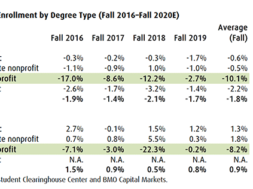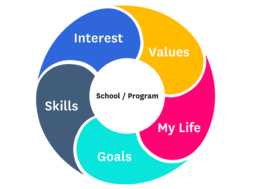
How Great Speaking Skills can Improve Online Admissions and Teaching Results
By Susan F. Schulz, EdD, Owner, Schulz School Advisors
It’s a new norm
This pandemic has created a new norm with lots of discoveries. The virtual admissions process is working for many schools and colleges in the sector. School owners tell us that an increased number of qualified students are enrolling. It may be because interested people don’t have to take time to drive back and forth to interview at the school. They don’t have to worry about childcare or an interruption in their workday. Interviewing in their own homes may reduce nervousness and they don’t have to worry about watching the clock so they can get back to their families.
There are many ways to be an effective virtual Admissions Advisor. One is to provide an exciting online virtual tour to prospective students that maintains their interest.
The tour should show off the school, equipment, and learning environment. There should also be a focus on the online learning “classrooms” and how they are run. If students are considering virtual enrollment, they need to see what it will be like attending school from their homes. Therefore, be sure to have a five-minute sample from one of your online classes. Without seeing or experiencing online learning ahead of time, how will they know?
Instructors teaching online are also reporting positive outcomes. This means that students “show up” for class, stay, participate, and meet course objectives. Of course, this depends on the online teaching and learning management systems the school uses and how well the teachers are trained to be effective online. With the right systems, instructors can track attendance and create an interactive online classroom so students are likely to enjoy success and complete each course. It is amazing the success students experience when roadblocks are removed. Roadblocks include the ability to get to class on time, deal with traffic, parking, childcare, feeling intimidated, work interruptions, and more.
To demonstrate how well your school delivers online learning it is important that everyone is aware of the need for effective speaking skills.
Skills needed in a virtual environment
What are the skills everyone needs when working remotely, going to school, or conducting business and social activities or doing anything virtually? Speaking skills! Online speaking skills require another level of speaking competency compared to in-person. When you are speaking in front of a camera there are limitations compared to being in a large classroom space. Yes, more than ever people need to know how to introduce themselves, talk in earnest and with confidence, be well organized, and use gestures and props especially on Zoom. They need to be able to use vocal variety, be aware of effective use of words to be easily understood – especially by speakers of other languages, be persuasive, speak with knowledge, and be able to inspire their listeners. Admissions staff and online instructors also need to be able to speak clearly and slowly, take pauses, and use appropriate facial expressions and body language – yes – even on platforms like Zoom, WhatsApp, FaceTime, GoToMeeting, Skype, Microsoft Team, and more.
How are speaking skills for a virtual environment learned
How do admissions representatives and instructors learn these virtual online speaking skills? It’s typically not taught in any admissions or online training classes. And who at your campus has the experience to teach this new way of communicating? By the way, in addition to speaking skills virtual meetings require thought and planning in other areas to be effective. This includes the best clothes to wear, where to sit and position yourself effectively in front of the camera, how to stand and move around in a limited space, and how to check that your appearance looks great! Your background also needs to be considered. Where do you sit so you look professional and not like you are communicating from a corner of your messy kitchen? How do you create an interesting background that relates to your job in admissions or the classroom?
You may be thinking that to effectively prepare your staff in these speaking skills will take hours. You might be thinking that you will have to hire expensive experts and consultants for the initial training and then conduct ongoing training and “checkups.” But no, there is an easy answer – Toastmasters International!
Toastmasters International as a solution
Toastmasters International has been in existence for over 95 years! It was developed by Ralph Smedley who believed in the need for leadership and speaking skills for everyone. Toastmasters.org or TM has clubs all over the U.S. and all over the world. In fact, there are more than 16,600 clubs in the world. This includes 143 countries. That means there is likely to be a club near you to join. There are membership fees that support each club and the international organization. And, members receive online learning materials.
Now, most of these clubs meet virtually and often on Zoom. Many of these clubs have members with great technical skills. This means Zoom is being used in new ways and on new levels. For example, PowerPoints and other visuals can be used while speakers are visible. Sometimes people are put in private Zoom rooms so they can talk with each other. Participants can post chats to everyone or message just one person at a time.
These skills from Toastmasters can be used at schools. One-on-one Zoom meetings can be planned by Admissions Advisors interviewing one student.
Or several student applicants can meet in a group with the Admissions Advisors and listen to questions and answers by everyone. This option may make nervous prospective students feel more comfortable.
Toastmasters skills for admissions and instructional staff
All Toastmasters clubs follow the same format – with some slight variations. This means that any club you might attend in the world will be similar. Therefore if you want to test how Toastmaster skills can benefit your school and staff, there are many opportunities. And since most clubs are virtual, you can “dial-in” to any.
There are three parts to each meeting:
- Prepared speeches: Toastmasters provides learning materials for members to learn communication skills. Members start with an “ice breaker” to introduce themselves and then proceed with each sequential assignment to learn basic speaking skills. Examples: introduction, how to organize a speech, getting to the point effectively, vocal variety, gestures, the importance of researching your topic, how to be persuasive, and more. You can see how these skills are needed by both Admissions and teaching staff.
- Evaluation: This is a 2 to 3-minute evaluation of the speech given by an assigned member. There is a format called the “Oreo cookie” approach: say something positive, suggest some improvement in a kind way, summarize with a positive focus and never be critical. Can you imagine if everyone on your staff took that approach?
- Table topics: During this part of the meeting members are given a topic and asked to give a one to two-minute presentation. This provides practice in speaking on one’s feet as the member is not aware s/he will be called. There are many times anyone on your work team will be asked to speak about something they are not prepared for and they need to look good. I was at a Toastmasters meeting in Kathmandu Nepal this past January and was called on to give a table topic. I did and I won and received a certificate and a photo of me. Look for the photo on my website!
| How Toastmasters skills are needed by admissions and teaching staff | ||||
| Toastmaster Skills | Useful for Admissions | Useful for Instructors | ||
| Ice breaker | Skills to make the potential student feel comfortable talking to you. | Important for students to learn about their teacher and gain confidence that the teacher has the knowledge needed to teach the course. | ||
| How to organize your speech | People can follow what you say if it has a beginning, middle, and end and seems sequential and logical. Otherwise, they will get lost. | New subject matter can be so confusing to students. Focusing on a beginning, middle and end can make the information more understandable. | ||
| Getting to the point | When presenting the features and benefits of the school to the prospective student the Admissions Advisor might make too many points – a reason to get to the point about why the potential student should enroll. Keep it simple. | Students can get lost when learning new information – a reason to get to the point and not take too many trips off course. | ||
| Vocal variety | A way to keep the potential student awake and enthused. | A way to keep students awake – especially when the subject matter isn’t that much fun. | ||
| Gestures | Demonstrates your enthusiasm and keeps people engaged. | Demonstrates your enthusiasm and keeps students engaged. | ||
| Researching the topic | Shows you know what you are talking about, what the school offers and allows you to speak on your feet – like table topics! | Shows you know what you are talking about and your topic of expertise. | ||
| How to be persuasive | A skill needed by every advisor. | Persuading students to listen is an important teaching skill. | ||
| How to inspire | Being inspirational is a skill needed by any advisor. | Being inspirational is a skill needed by instructors to help show the importance of their topic. | ||
Check out Toastmasters.org for a club near you. Remember there are 16,600 clubs in the world! While you can join a club at a distance it is good to join a local club. Then when clubs meet in person you will already know the people in your club. And your school can suggest that all staff and faculty join. At some point you might want to consider starting a club at your campus. It’s possible. There are many businesses that already have their own Toastmaster clubs on site. Toastmasters International provides you with the technical support to charter a new club.
If you want a “taste’ of Toastmasters join my club – Boca Raton Toastmasters, https://bocaratontoastmasters.org/. We meet via Zoom on Tuesday nights from 6:45 pm to 8:45 PM EST. Email me at susan@schulzschooladvisors.com and I’ll send you the link. You don’t have to talk except to provide your name and why you joined the meeting. You can tell the group that I made you give it a try!
DR. SUSAN F. SCHULZ is Founding Owner of Schulz School Advisors and president of Susan F. Schulz & Associates, Inc. She has been an innovator in the career school sector for over 27 years and focuses on for-profit schools and colleges in the U.S. and internationally.
Dr. Schulz has spoken at various career school and college-related organizations. In January 2020 she met with college owners throughout India and also in Katmandu and focused on alliances with U.S. universities. In 2014 she was invited to give a college graduation speech in North Africa and began her presentation in English, French, and Academic Arabic. Her talk was “Make a Difference,” which is the focus of her daily goals.
Dr. Schulz’s articles have appeared in Career College Central and Career Education Review. In 2012 an entire issue that focused on the benefits of Alumni Communities, was written and edited by Dr. Schulz, and published and distributed by Career Education Review.
Dr. Schulz has been a member of Toastmasters International since the mid-1990s. When traveling she enjoys visiting local clubs in countries she visits.
Contact Information: Susan F. Schulz, Ed.D. // Founder // Schulz School Advisors // 561-483-955 // susan@susanfschulz.com // susanfschulz.com, schulzschooladvisors.com // LinkedIn











